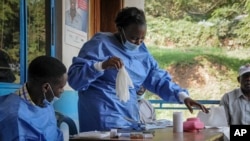When Ebola broke out in Uganda in September, 10 doctors immediately stepped forward to work in an isolation unit at Fort Portal Regional Referral Hospital, but now only three are left.
Two health workers at the hospital in western Uganda have died from Ebola in this outbreak. Nationwide, 15 health workers have tested positive and six have died.
"At the beginning the number of health workers willing to work in that unit was good but now we have low coverage. If we get five cases the work we do is overwhelming," said the doctor, who avoids discussing their work for fear of being stigmatised.
"But if we all run away all of us will get sick," the doctor said, adding the hospital sometimes lacked fluids essential for treatment.
Ugandan health ministry incident commander, Dr. Henry Kyobe Bosa, denied there are staff or resource shortages. Intensive care staff work maximum eight-hour shifts and personnel from Ebola-free regions are rotated in, he said.
But staff coverage was 40% before the outbreak, and Ebola is now "crippling the system indirectly," according to Dr. Alone Nahabwe, the Uganda Medical Association's head of worker welfare.
Uganda has one of the world's lowest doctor-to-patient ratios, with one doctor for every 25,000 people, versus the one-to-1,000 ratio recommended by the World Health Organization (WHO).
Experts worry about cases spreading. On Sunday the first case was reported in the country's east.
"The staff numbers that you need under IPC (infection, prevention and control), surveillance, contact tracing, the numbers are big," said Dr Miriam Nanyunja, a WHO adviser for emergency risk management currently in Uganda.
"While the numbers of cases are not many, the geographic spread is going up," she said. "If it goes on much longer you will need a lot more resource mobilisation."
The WHO and aid groups are providing Uganda with assistance to cope with the Ebola outbreak, and the United States says it has channelled $22 million through local partners.
Yet Uganda still faces significant funding shortfalls -- a WHO official said an initial $20 million the government earmarked was burned through in the first month as cases soared.
